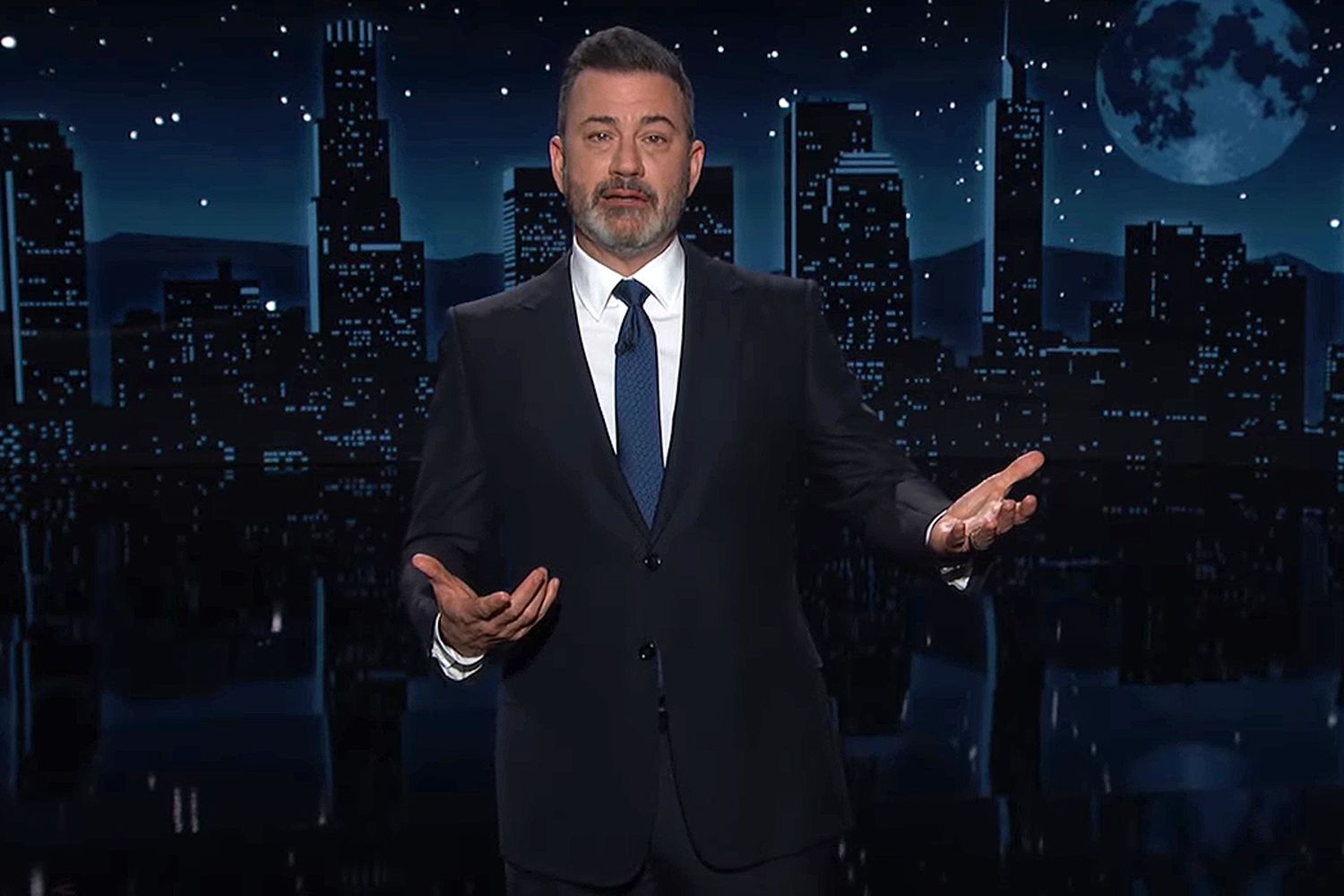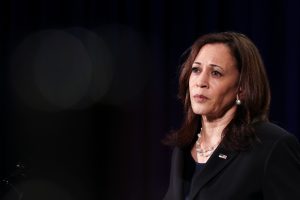Jimmy Kimmel returned to the late-night stage this week after a storm of controversy and suspension that had left both his fans and critics wondering whether Jimmy Kimmel Live! would ever feel the same again. His comeback episode was more than just another night of comedy; it was a deeply personal and emotional moment that mixed humor with heartfelt reflection on loss, forgiveness, and national division.
The host began the night with the kind of joke that has long defined his comedic voice—sharp, sarcastic, and unafraid to poke fun at the most powerful figures in politics. But it was what followed that has already left a lasting impression on viewers: an emotional tribute to Charlie Kirk, the conservative activist whose recent assassination has roiled the country, and a powerful acknowledgment of Erika Kirk’s extraordinary grace in the face of tragedy.
Humor Before Heartache
Kimmel opened his monologue with a familiar rhythm, using light banter to break the ice and set the tone for his return.
“I’m not sure who had a weirder 48 hours — me, or the CEO of Tylenol,” he quipped, referencing Donald Trump’s widely discussed remarks about Tylenol and autism. The joke landed, drawing laughter from the studio audience. For a brief moment, the energy resembled the show’s typical late-night atmosphere.
But then, in a deliberate tonal shift, Kimmel moved to address the elephant in the room: the assassination of Charlie Kirk and the controversy surrounding his own earlier remarks. The atmosphere in the room changed instantly, the audience leaning in as Kimmel dropped the jokes and spoke with visible vulnerability.
Confronting the Controversy
“I’ve been hearing a lot about what I need to say and do tonight,” Kimmel admitted, his voice measured. “And the truth is, I don’t think what I have to say is going to make much of a difference. I have no illusions about changing anyone’s mind.”
With those words, Kimmel acknowledged both the criticism he has faced and the polarized climate in which his show now exists.
He emphasized that it had never been his intention to make light of Kirk’s murder. He reminded viewers that he had already expressed his condolences to the Kirk family on Instagram, but he took the moment to repeat them publicly and directly.
“It was never my intention to diminish the life of a young man whose loss is devastating to his loved ones and to many across this country,” Kimmel said.
A Tearful Reflection on Forgiveness
Then came the moment that has already been replayed and circulated widely online. Kimmel, fighting back tears, spoke about Erika Kirk, Charlie Kirk’s widow, and the message she delivered at her husband’s memorial service.
“She forgave the man who shot her husband,” Kimmel said, pausing as his voice cracked. “She forgave him.”
He described her words as “a selfless act of grace, forgiveness from a grieving widow” and said her example was one the entire country should look to in a moment of bitterness and division.
“If you believe in the teachings of Jesus as I do, there it was,” Kimmel added. “That’s it. That’s the example. To forgive in the face of the unbearable.”
His emotional tribute left the studio audience silent for several moments before a wave of applause swept through.
Forgiveness as a National Lesson
Kimmel went on to explain how Erika Kirk’s words had moved him personally, saying they had “touched me deeply” and reminded him of the importance of grace in public life.
“If there’s anything we should take from this tragedy to carry forward, I hope it can be that, and not all of this,” he said, gesturing to the broader controversy around his own role in the debate.
He argued that her act of forgiveness offered a powerful counterexample to the hostility dominating America’s political discourse. “What Erika Kirk did wasn’t just for her family,” Kimmel said. “It was for all of us—to show us what is possible when we put love and faith above hatred and revenge.”
Audience Reactions
Inside the studio, Kimmel’s remarks were met with a mixture of applause, tears, and quiet attentiveness. Outside the studio, reactions were predictably split.
Supporters praised Kimmel for his humility, vulnerability, and willingness to acknowledge the gravity of Erika Kirk’s words. Social media feeds filled with messages from viewers who said they were moved by his tearful delivery and saw it as a sign of personal growth.
Critics, however, remained skeptical. Some accused Kimmel of attempting to repair his public image without fully addressing what they considered inappropriate comments earlier in the month. Others argued that his show should remain suspended until a broader reconciliation is reached between ABC and its affiliates.
Affiliates Still Hold the Power
Kimmel’s moving monologue comes at a time when his very platform remains in flux. Despite Disney’s decision to reinstate Jimmy Kimmel Live!, two of ABC’s largest affiliate groups—Sinclair Inc. and Nexstar Media Group—have refused to air the show. Their combined reach represents nearly a quarter of ABC’s nationwide footprint, meaning millions of potential viewers cannot watch Kimmel’s comeback episodes on traditional TV.
Both companies have demanded stronger accountability measures from ABC and, in Sinclair’s case, even suggested Kimmel personally apologize to the Kirk family and contribute to Turning Point USA, the organization Charlie Kirk founded.
So while Kimmel’s words may have resonated with many, it is not yet clear if they will be enough to sway affiliates who continue to block his program.
The Bigger Picture for Late Night
The emotional return of Jimmy Kimmel also underscores the shifting role of late-night television in America. Once a bastion of light entertainment and celebrity interviews, the format has become increasingly political over the past decade. Hosts like Kimmel, Stephen Colbert, and others now regularly use their monologues to weigh in on national issues, often alienating part of the audience in the process.
Kimmel’s teary tribute to Erika Kirk may highlight the risks and rewards of that trend. By addressing national tragedy through the lens of his personal beliefs, he reinforced his reputation as both a comedian and a cultural commentator. Yet, it also deepened the stakes of the affiliate battle that threatens his show’s future.
A Divided Audience, A Defining Moment
Ultimately, Kimmel’s comeback monologue was less about jokes and more about conscience. By weaving humor with heartfelt reflection, he tried to strike a balance between the entertainer his audience expects and the citizen he feels called to be.
The sight of him breaking down on stage served as a reminder that even seasoned performers are not immune to the weight of national grief. His tribute to Erika Kirk may not resolve the controversies swirling around him, but it demonstrated a willingness to confront them head-on, with sincerity rather than defiance.
Conclusion
Jimmy Kimmel’s emotional return was far from a standard late-night routine. It was a moment of vulnerability, shaped by national tragedy and the extraordinary example of forgiveness set by Erika Kirk.
Whether his words will be enough to repair strained relationships with affiliates and critics remains to be seen. But for viewers who tuned in, the takeaway was clear: behind the jokes and satire, Kimmel is a man grappling with the same grief, confusion, and longing for healing that defines much of America today.
In the end, it may not be the jokes from his comeback show that people remember most—but the tears he shed and the grace he admired in a widow’s voice.

James Jenkins is a celebrated Pulitzer Prize-winning author whose work has reshaped the way readers think about social justice and human rights in America. Raised in Atlanta, Georgia, James grew up in a community that instilled in him both resilience and a strong sense of responsibility toward others. After studying political science and creative writing at Howard University, he worked as a journalist covering civil rights issues before dedicating himself fully to fiction. His novels are known for their sharp, empathetic portraits of marginalized communities and for weaving personal stories with broader political realities. Jenkins’s breakout novel, Shadows of Freedom, won national acclaim for its unflinching look at systemic inequality, while his more recent works explore themes of identity, resilience, and the fight for dignity in the face of oppression. Beyond his novels, James is an active public speaker, lecturing at universities and participating in nonprofit initiatives that support literacy and community empowerment. He believes that storytelling is a way to preserve history and inspire change. When not writing, James enjoys jazz music, mentoring young writers, and traveling with his family to explore cultures and stories around the world.









